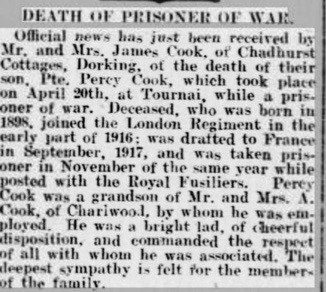Thank you to Westcott Local History Group for allowing Dorking Museum to publish their First World War research. Thank you to Lenka Cathersides for further research.
Percy Charles James Cook was born in 1898, the son of James and Ellen Cook of Ifield Road, Charlwood.
Percy was shown living there with his grandparents in the 1911 census and he is remembered on the Charlwood war memorial. We have not yet established his connection with Westcott, but at his enlistment at Horley his place of residence was shown as Dorking and he may have been living in Westcott at the time. His parents were living at Chadhurst Cottages on Coldharbour Lane in 1918, which also may have been the Westcott connection.
His name is on the Holy Trinity war memorial, but not on the memorial at St John’s Chapel. Percy’s entry in “Soldiers Died in the Great War” shows he enlisted with the 2nd/5th Battalion of The Queen’s and later transferred to the Royal Fusiliers, possibly serving in 1/3rd (City of London) Battalion. After a tour in Malta, this unit sailed to France in January 1917 and served on the western front for the rest of the war. In January 1918 the battalion absorbed the disbanded 2/3rd Battalion and was renamed as the 3rd (City of London) Battalion, Royal Fusiliers, part of the 58th (2/1st London) Division. On 21st March 1918 the battalion was in the area of St Quentin and it was here that the German High Command launched ‘Operation Michael’. This was the start of the great spring offensive which aimed to break through the allied lines and capture the channel ports. In preparing for this the Germans were able to move nearly 50 divisions from the east after the Russian surrender in 1917 and the allies were heavily out-numbered. The Battle of St Quentin lasted from 21st to 23rd March and the British were forced to retreat. The German offensive continued until 4th April when the allied lines held and the advance of the German armies was halted. A stalemate followed until 8th August when the Allies’ counter-offensive began; this continued until the war ended on 11th November. The losses on both sides in March-April 1918 were enormous. The Allies suffered 255,000 casualties and the Germans 250,000.
In November 1917 Private Cook was taken as a prisoner of war.

DEATH OF PRISONER OF WAR
Official news has just been received by Mr. and Mrs. James Cook, of Chadhurst Cottages, Dorking, of the death of their son, Pte. Percy Cook, which took place on April 20th, at Tournai, while a prisoner of war. Deceased, who was born in 1898, joined the London Regiment in the early part of 1916: was drafted to France in September, 1917, and was taken prisoner in November of the same year while posted with the Royal Fusiliers. Percy Cook was a grandson of Mr. and Mrs. A. Cook of Charlwood, by whom he was employed. He was a bright lad, of cheerful disposition, and commanded the respect of all with whom he was associated. The deepest sympathy is felt for members of the family.
Percy Charles James Cook Death Notice © Surrey Mirror findmypast.co.uk

SURREY AND THE WAR
GOOD NEWS
In our last issue was announced the death of Pte. Percy Cook, of the London Regiment, while a prisoner of war at Tournai. The glad news has now reached his parents, Mr. and Mrs. James Cook of Chadhurst Cottages, Dorking, through the Central Prisoners of War Committee and the Ladies’ Association of the Regiment that Pte. Cook is alive and well.
Percy Charles James Cook Update © Surrey Advertiser findmypast.co.uk

GOOD NEWS NOT CONFIRMED
In our issue of August 9th the death was announced of Pte. Percy Cook, of the London Regt, while a prisoner of war at Tournai, Belgium. In the issue of the following week we were able to publish the news that a mistake had been made, and the lad was alive and well. Further intelligence has now reached the parents Mr. and Mrs. James Cook, of Chadhurst Cottages, Dorking, confirming the correctness of the first report that Pte. Cook died on April 20th.
Percy Charles James Cook Death Notice © Dorking Advertiser findmypast.co.uk
Percy Cook died of wounds on the 20th of April 1918 as a prisoner of war at Tournai in Belgium.
Private Cook was buried at the Tournai Communal Cemetery Allied Extension in Belgium. His grave reference number is: II. B. I. Tournai is some distance from the St Quentin area; it was captured by the Germans in August 1914 and remained in their hands until August 1918. This suggests that Percy was perhaps captured having been wounded and was taken to Tournai where he died as a prisoner of war – 75,000 British troops were taken prisoner in those desperate days of March-April 1918.
Percy Charles James Cook was a bright lad of cheerful disposition and commanded the respect of all with whom he was associated. He was a grandson of farmer Amos Cook of Charlwood, by whom he was employed. (1918 Surrey Mirror)
In 1918, Private Cook’s parents lived in Chadhurst Cottages in Dorking.
Percy Cook was awarded the British War and Victory medals.
Private Cook’s father James Cook received £12, 15s and 5d on the 22nd of January 1919 and a further £9 and 10s on the 5th of December 1919 in Soldier’s Effects.
| Born | Charlwood, West Sussex | |
| Lived | Westcott, Surrey | |
| Son of | James and Ellen Cook, Ifield Rd, Charlwood, West Sussex | |
| Regiment | 1st/3rd Battalion. London Regiment (Royal Fusiliers) | |
| Number | 275308 | |
| Date of Death | 20th April 1918 | |
| Place of Death | Tournai, Belgium | |
| Cause of Death | Killed in Action | |
| Age | 20 | |
| Cemetery | Tournai Communal Cemetery, Hainaut |

